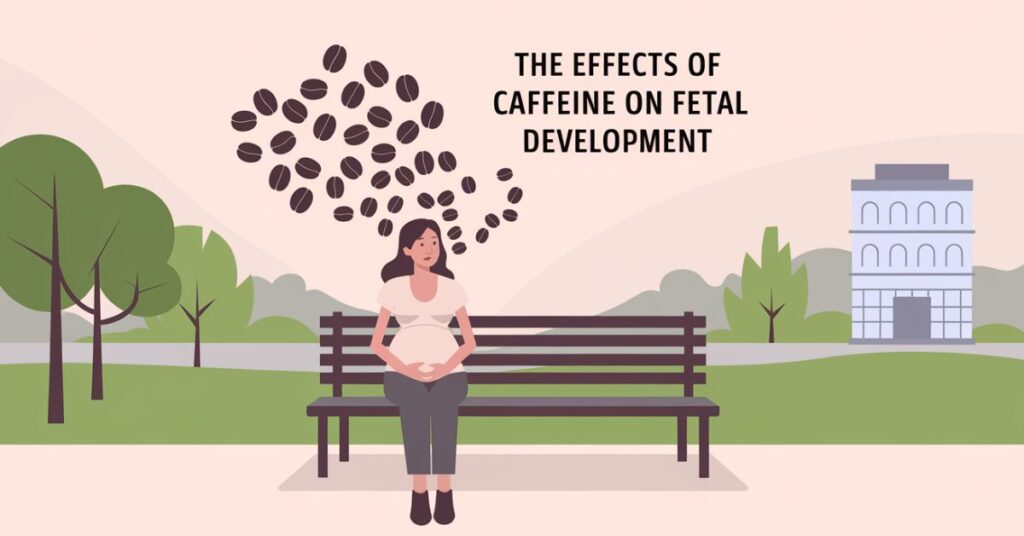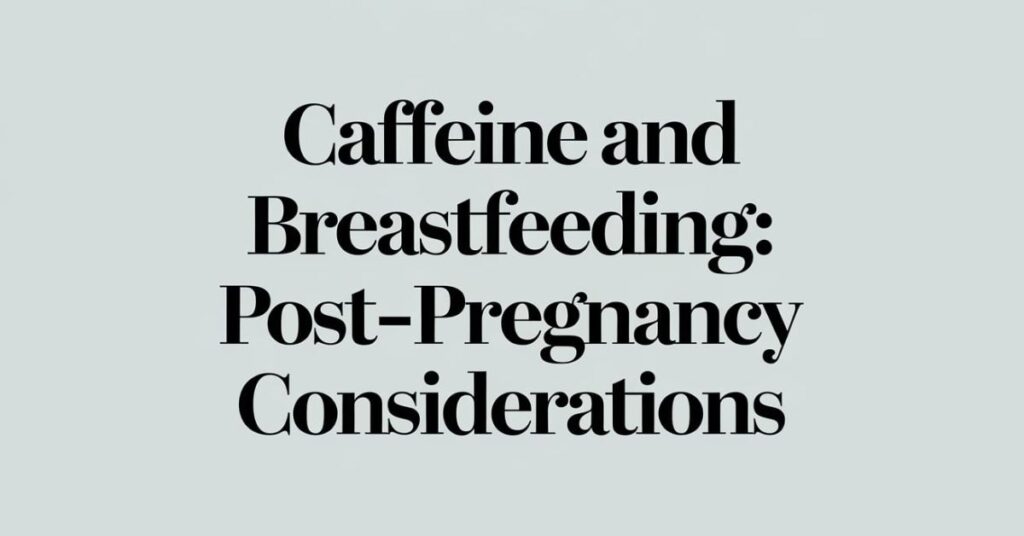Caffeine during pregnancy is a common concern for expectant mothers. While complete avoidance isn’t necessary, moderation is key. Understanding safe limits is crucial for maternal and fetal health.
Most health organizations recommend limiting caffeine to 200 milligrams per day during pregnancy. This equates to roughly one 12-ounce cup of coffee or two small cups of tea.
It’s important to remember that caffeine is found in various sources beyond coffee and tea. Pregnant women should be aware of hidden caffeine in foods and drinks to monitor their intake accurately.
The Basics of Caffeine and Pregnancy
Caffeine, a natural stimulant found in coffee, tea, and many other beverages, crosses the placenta easily. While your body can process caffeine efficiently, your baby’s developing system cannot handle it as well.
This reality raises important questions about safe caffeine intake during pregnancy. Understanding how caffeine affects both you and your baby is crucial for making informed decisions.
Many expectant mothers find themselves wondering about their daily cup of coffee or tea. It’s essential to know the facts and guidelines to ensure the best for you and your little one.
What Foods and Drinks Have Caffeine ?
Caffeine is a natural stimulant found in various foods and beverages. While coffee and tea are well-known sources, caffeine can be present in many other products as well.
- Coffee (brewed, instant, espresso)
- Tea (black, green, white, oolong)
- Soft drinks (cola and some non-cola sodas)
- Energy drinks
- Chocolate (dark chocolate contains more than milk chocolate)
- Hot cocoa
- Yerba mate
- Some ice creams and frozen yogurts
- Energy bars
- Pre-workout supplements
- Some medications (like certain pain relievers and cold medicines)
- Guarana seeds and supplements
- Some flavored waters
Understanding Caffeine’s Impact on Your Pregnancy

Caffeine during pregnancy affects your body in several ways during pregnancy. It can increase your heart rate and blood pressure, potentially impacting blood flow to the placenta.
As a diuretic, caffeine during pregnancy can lead to increased urination and potential dehydration if not balanced with adequate fluid intake. This is especially important during pregnancy when staying hydrated is crucial.
Lastly, caffeine during pregnancy can interfere with iron absorption, which is vital for your baby’s development. Balancing your caffeine during pregnancy intake with iron-rich foods or supplements may be necessary.
Current Guidelines: How Much Caffeine is Too Much?
Health organizations worldwide have set pregnancy caffeine limits to balance safety with practicality. The American College of Obstetricians and Gynecologists (ACOG) recommends limiting caffeine to less than 200 mg per day.
This is roughly equivalent to one 12-ounce cup of coffee. The World Health Organization (WHO) suggests a similar limit, advising pregnant women to consume no more than 300 mg of caffeine daily.
It’s crucial to note that these are upper limits, not targets. Many healthcare providers recommend even lower intake or complete avoidance if possible, especially during the first trimester.
Problems from Drinking too Much Caffeine
Caffeine, during pregnancy while beneficial in moderation, can lead to various health issues when consumed excessively. Overconsumption of caffeine may result in both short-term and long-term effects on the body and mind.
- Insomnia or difficulty sleeping
- Increased anxiety and restlessness
- Rapid or irregular heartbeat
- Digestive issues (e.g., upset stomach, diarrhea)
- Headaches and migraines
- Dehydration
- Increased blood pressure
- Dependency and withdrawal symptoms
- Muscle tremors or jitters
- Increased urination
- Caffeine intoxication (in extreme cases)
- Interference with calcium absorption
- Worsened symptoms of certain mental health conditions
- Interactions with medications
- Reduced fertility in women (potential risk)
- Increased risk of miscarriage during pregnancy
Common Sources of Caffeine: More Than Just Coffee

Understanding caffeine content in various sources is key to managing your intake. While coffee is often the primary concern, caffeine lurks in many other beverages and foods.
Tea, both black and green, contains caffeine, though generally less than coffee. Soft drinks, especially colas, can also contribute significantly to your daily intake of caffeine during pregnancy .
Even chocolate contains caffeine, with dark chocolate typically having higher levels than milk chocolate. Being aware of these sources helps you make informed choices throughout your pregnancy.
Hidden Sources of Caffeine to Watch Out For
Caffeine during pregnancy isn’t just in obvious sources like coffee and tea. It can hide in unexpected places, making it challenging to track your intake accurately.
Some medications, including over-the-counter pain relievers and cold medicines, often contain caffeine. Always check labels carefully and consult with your healthcare provider before taking any medication during pregnancy.
Even some flavored waters, yogurts, and energy bars may contain caffeine. Reading labels diligently can help you avoid unintended consumption and stay within recommended limits.
The Effects of Caffeine on Fetal Development

Understanding the effects of caffeine during pregnancy is crucial for making informed decisions. Research in this area is ongoing, but some patterns have emerged regarding potential risks.
High caffeine during pregnancy intake has been associated with increased risk of low birth weight in some studies. Some research also suggests it may slightly increase the risk of miscarriage, especially in the first trimester.
However, it’s important to note that moderate caffeine consumption (within recommended limits) hasn’t been conclusively linked to negative outcomes. Always discuss your specific situation with your healthcare provider.
Energy Drinks and Pregnancy: A Risky Combination
The question “can you drink energy drinks while pregnant?” is common among expectant mothers. The short answer is that it’s not recommended due to several concerns.
Energy drinks often contain high levels of caffeine, sometimes exceeding 300 mg per serving. This far surpasses the recommended daily limit for pregnant women, potentially putting you and your baby at risk.
Moreover, these beverages frequently contain other stimulants and additives whose effects on pregnancy aren’t well-studied. Given these factors, most healthcare providers strongly advise against consuming energy drinks during pregnancy.
Caffeine-Free Alternatives for Expectant Mothers
If you’re looking to cut back on caffeine during pregnancy , plenty of alternatives can help you stay refreshed and energized. Herbal teas, such as peppermint or ginger, are naturally caffeine-free and offer various health benefits.
Fruit-infused water can be a refreshing choice, providing hydration and a flavor boost without caffeine. It’s an excellent way to stay hydrated and satisfy your taste buds.
For a warm, comforting drink, try golden milk made with turmeric and warm milk (dairy or plant-based). It’s not only caffeine-free but also offers potential anti-inflammatory benefits.
Navigating Conflicting Studies and Opinions
The topic of caffeine and pregnancy risks isn’t without controversy. Different studies have yielded varying results, leading to ongoing debate among researchers and healthcare professionals.
Some recent research suggests that even low caffeine intake may affect fetal growth. A 2020 study in BMJ Evidence-Based Medicine proposed that no level of caffeine is completely safe during pregnancy.
However, other studies find no significant risks with moderate consumption. This inconsistency in findings highlights the complexity of the issue and the need for personalized advice from your healthcare provider.
Caffeine Sensitivity During Pregnancy: Listen to Your Body
Caffeine during pregnancy can change how your body responds to caffeine, often increasing sensitivity. Many women find their usual caffeine intake suddenly causes jitters or insomnia.
This heightened sensitivity is due to hormonal changes and slower caffeine metabolism during pregnancy. It’s essential to pay attention to how your body reacts to caffeine.
If you notice increased sensitivity, it might be wise to further reduce your caffeine consumption. Always prioritize your comfort and well-being during this special time.
Decaf Options: Understanding the Reality
Decaffeinated coffee and tea are popular alternatives for those cutting back on caffeine. However, it’s important to understand that “decaf” doesn’t mean completely caffeine-free.
Most decaf coffees still contain small amounts of caffeine, typically 2-12 mg per 8-ounce cup. While this is significantly less than regular coffee, it’s not zero.
If you’re extremely sensitive or trying to avoid all caffeine, be aware of this residual amount. The decaffeination process also varies, affecting the final caffeine content.
Caffeine and Breastfeeding: Post-Pregnancy Considerations

Once your baby arrives, you might wonder if caffeine rules change for breastfeeding mothers. Generally, caffeine restrictions are less strict during breastfeeding compared to pregnancy.
Most healthcare providers agree that moderate caffeine consumption (up to 300 mg per day) is safe while breastfeeding. However, it’s important to remember that caffeine can pass through breast milk.
Some babies may be more sensitive to caffeine during pregnancy than others. Watch for signs of restlessness or sleep disturbances in your baby after you consume caffeine during pregnancy and adjust your intake if necessary.
Practical Tips for Reducing Caffeine Intake
Reducing caffeine during pregnancy intake can be challenging, especially if you’re used to regular consumption. Start by gradually reducing your intake over time to minimize withdrawal symptoms like headaches.
Try mixing regular and decaf coffee to create a half-caf option, slowly increasing the decaf ratio. Exploring herbal teas or caffeine-free alternatives can help satisfy the ritual of a warm beverage.
Stay hydrated with water to combat fatigue, and get regular exercise (as approved by your doctor) for natural energy boosts. These strategies can help you adjust to lower caffeine during pregnancy levels comfortably.
The Role of Genetics in Caffeine Metabolism
Interestingly, genetics play a role in how your body processes caffeine, potentially affecting its impact on your pregnancy. Some people are “fast metabolizers” of caffeine, while others are “slow metabolizers.”
Fast metabolizers process caffeine during pregnancy more quickly, potentially reducing its effects on both the mother and fetus. Slow metabolizers, on the other hand, may be more sensitive to caffeine’s effects.
While genetic testing for metabolism of caffeine during pregnancy isn’t routine in prenatal care, understanding your general caffeine sensitivity can guide your choices during pregnancy.
Caffeine and Specific Pregnancy Complications

Several studies have explored links between caffeine intake and specific pregnancy complications. Some research suggests high caffeine intake might increase miscarriage risk, particularly in the first trimester.
Studies on caffeine and preterm birth have yielded mixed results, with most finding no significant link at moderate intake levels. However, consistent high caffeine intake has been associated with slightly lower birth weights in some studies.
While rare, very high caffeine intake has been linked to a slight increase in stillbirth risk in some research. It’s important to note that many of these studies show correlation, not causation.
Practical Strategies for Monitoring Caffeine Intake
Keeping track of your caffeine consumption can be tricky, but it’s essential for staying within recommended limits. Using a food diary or app to log your caffeine intake can be helpful.
Read labels carefully, including on foods and medications, and be aware of serving sizes, especially with coffee shop beverages. Consider using a caffeine calculator tool for accurate tracking.
Always communicate openly with your healthcare provider about your caffeine habits. They can provide personalized advice based on your specific health history and pregnancy circumstances.
Read this Blog : Challenging Piaget: A Deep Dive into Criticisms of Cognitive Development Theory
Global Perspective
Different countries have varying guidelines for caffeine in pregnancy, reflecting the global nature of this concern. The USA’s ACOG and the UK’s National Health Service both recommend less than 200 mg per day.
Australia’s Food Standards Australia New Zealand and the European Food Safety Authority also suggest limiting caffeine to 200 mg daily. While guidelines vary slightly, the consensus is clear: moderation is key.
These global recommendations underscore the importance of being mindful of caffeine intake during pregnancy, regardless of where you live.
Bottom Line
Navigating caffeine consumption during pregnancy can feel overwhelming, but remember that the goal is to make informed, balanced choices. While current guidelines suggest moderate caffeine intake is generally safe, every pregnancy is unique.
Always consult with your healthcare provider for personalized advice tailored to your specific situation. They can consider your health history, pregnancy circumstances, and personal preferences to guide you.
Ultimately, pregnancy is a time of joy and growth. By staying informed and making thoughtful choices about caffeine consumption, you’re already giving your baby a great start in life.
Frequently Asked Questions
Is it safe to drink coffee while pregnant?
Moderate coffee consumption (200 mg caffeine or less daily) is generally considered safe during pregnancy.
How does caffeine affect a fetus?
Caffeine can cross the placenta, potentially affecting fetal heart rate and sleep patterns.
Can I drink green tea while pregnant?
Yes, in moderation. Green tea contains less caffeine than coffee but still counts towards your daily limit.
Does caffeine increase miscarriage risk?
Some studies suggest high caffeine intake may increase miscarriage risk, especially in the first trimester.
Are energy drinks safe during pregnancy?
Energy drinks are not recommended during pregnancy due to their high caffeine content and other additives.

Zade Smith is a Proficient writer on TechsBlip, dedicated to delivering high-quality content that bridges the gap between medical research and accessible, reader-friendly guidance. With a keen interest in promoting healthy lifestyles and disease prevention, Zade’s writing offers expert insights, actionable tips, and evidence-based information to help readers make informed decisions about their health and wellness

